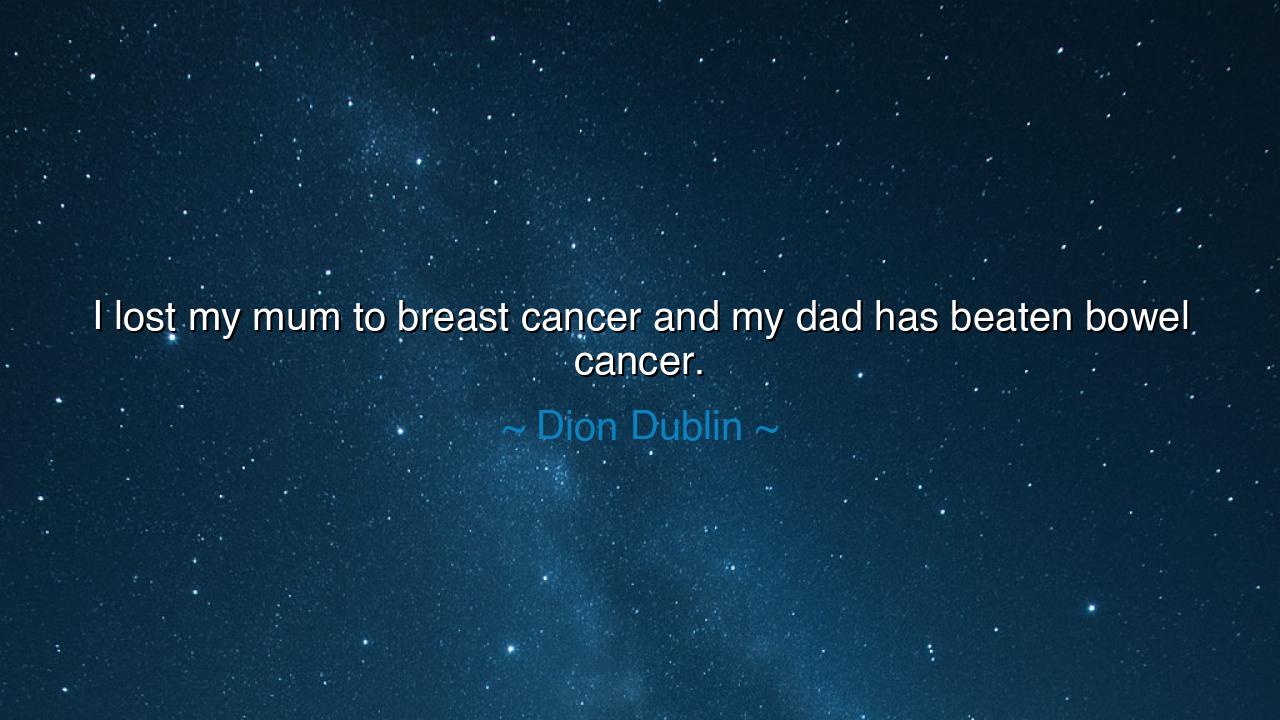
I lost my mum to breast cancer and my dad has beaten bowel






In the quiet chamber of remembrance, Dion Dublin, the footballer and man of heart, once spoke these deeply human words: “I lost my mum to breast cancer and my dad has beaten bowel cancer.” Though simple in form, these words carry the full weight of grief and triumph, of loss and endurance intertwined. They are not only the record of one man’s sorrow and gratitude, but the song of countless souls who have walked through the valley of suffering and yet found the courage to rise. Within them lies the dual truth of life — that pain and hope often dwell side by side, and that even in the shadow of death, the light of resilience still burns.
The origin of these words is not in fame or philosophy, but in the sacred ground of family. They spring from the universal story of the child who watches, powerless, as illness claims one parent and spares another. In this duality, Dion Dublin’s voice becomes the voice of all who have tasted both mourning and mercy. His mother’s passing to breast cancer speaks to the cruel certainty of mortality — that even love cannot always shield us from nature’s tide. Yet his father’s victory over bowel cancer reminds us that life is not without miracles, that strength, will, and the grace of healing can overcome even the fiercest foe. Thus, the quote becomes a hymn to the endurance of the human spirit, to the balance between sorrow and salvation.
Throughout the ages, the wisest among us have recognized this sacred tension. The philosopher Epictetus, born into slavery, taught that suffering is not punishment but preparation — the forge in which the soul is tempered. And the physician Hippocrates, father of medicine, saw illness not merely as an enemy, but as a teacher, revealing the body’s limits and the soul’s will to survive. So too, Dion Dublin’s reflection teaches us to see in every tragedy the outline of endurance — to understand that grief, while it wounds, also deepens the soul’s compassion. For in the loss of his mother, he found reverence for life; in the survival of his father, he found the living proof that hope is never vain.
It is easy, when faced with the cruelty of disease, to ask why fate strikes the innocent. Yet history reminds us that the human race has always battled forces beyond its control — plague, famine, and despair — and through each trial, it has learned to fight, adapt, and heal. When Marie Curie, who devoted her life to the study of radiation, lost her own health to the very forces she discovered, she did not curse her suffering. She called it the price of knowledge — the cost of giving light to others. In her struggle, and in the struggles of all who have faced illness with courage, we see the same truth that beats within Dublin’s words: that pain can be transformed into purpose, and that love, though wounded, can still endure.
The loss of a mother — the heart’s first home — is a sorrow that reshapes the world. Yet the victory of a father over illness becomes a living monument to perseverance. Dion Dublin’s words remind us that even as one light fades, another continues to burn. It is this rhythm of endings and beginnings that defines our mortal journey. Life is not meant to be free of sorrow; it is meant to teach us strength through sorrow. Those who have known grief know also the depth of love; those who have stood at the edge of loss understand how precious a single heartbeat, a single sunrise, can be.
The lesson, then, is clear and sacred: cherish life, but do not fear its fragility. Love your family not as if they will live forever, but because they are living now. Give thanks each day for breath, for touch, for the quiet miracle of health. When illness comes — as it surely will, in some form or another — meet it with courage, and when healing comes, meet it with gratitude. For both, as Dion Dublin’s story reveals, are teachers of the heart. Sorrow shows us what cannot be replaced; survival reminds us what still can be saved.
So, my children of the future, remember this truth: every family bears both graves and victories, and both are holy. To lose is to be reminded of the fleeting nature of existence; to triumph is to celebrate the endurance of love. Let grief make you kinder, and gratitude make you strong. For in this balance — between loss and survival — lies the essence of being human. And as Dion Dublin teaches through the quiet poetry of his own experience, life’s worth is not measured by how long it lasts, but by how deeply it is loved, how bravely it is lived, and how fiercely it continues, even after the pain.






AAdministratorAdministrator
Welcome, honored guests. Please leave a comment, we will respond soon